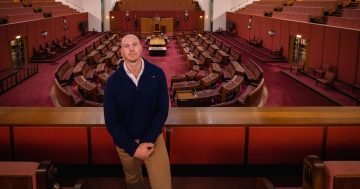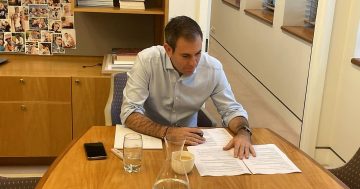
Senator David Pocock, along with fellow crossbencher Jacqui Lambie, has called for tax reform on investment property concessions. Photo: Supplied.
ACT independent senator David Pocock has teamed up with fellow crossbench senator Jacqui Lambie to press the government on housing policy, saying tax concessions on investment properties should be reformed.
The pair commissioned the Parliamentary Budget Office to model how such tax reforms could affect housing affordability, and say it would not only boost it but also deliver $60 billion to the national budget over a decade.
Describing it as the most sophisticated modelling published to date, the senators said it provides for a range of options and behavioural assumptions.
One big plus, they say, is that the research shows it is possible to protect people’s existing investments while moving to a model that uses tax concessions to incentivise new supply.
“The housing crisis is so widespread and so severe we need governments pulling every available lever to increase housing supply and affordability,” Senator Pocock said.
“Tax reform on its own won’t solve the housing crisis but it can be a powerful tool to drive new supply and should be on the table for sensible debate.”
The PBO modelling involved five distinct combinations of changes to negative gearing and the Capital Gains Tax (CGT) discount.
All five involved some degree of ‘grandfathering’ or exempting existing property investors from proposed changes.
“I think most Australians would agree that we need to fix the housing crisis and negative gearing is part of the problem,” Senator Lambie said.
“But protecting the mum and dad investors and retirees who have invested in housing must also be part of the solution.
“Because this Labor Government got their arses kicked in the 2019 election, they won’t talk about fixing negative gearing.
“Senator Pocock and I have done the work and I hope the Treasurer and the Prime Minister will be brave and take this opportunity to consider these sensible reforms.”
The most modest reform option modelled has the CGT discount grandfathered for existing rentals and halved for newly built homes.
It would retain negative gearing on a landlord’s first rental property, and save the federal budget $16 billion by 2033-34.
The senators say this saving could be redirected to invest in the supply of social and affordable housing.
Other reforms modelled could save up to $60 billion over the same period.
The main behavioural impacts of tax reforms factored into the PBO projections are the likely disposal of some rental properties by existing property investors and a reduced number of potential investors acquiring homes for this purpose.
With more rental properties being sold and fewer aspiring property investors among potential buyers during this adjustment period, the senators say first home buyer acquisitions would likely increase and push up the home ownership rate from its currently depressed level.
The crossbenchers have also pointed to other research to back their position.
Earlier calculations by the Grattan Institute projected that abolishing negative gearing and halving the CGT discount would leave prices two per cent lower than what they would otherwise have been.
Research undertaken by NSW Treasury showed that in modelling the impact of abolishing negative gearing and halving the capital gains tax discount for landlord investors would increase the owner-occupied share of the private dwelling stock by 4.7 per cent effectively returning home ownership in Australia to 1990s levels.
Polling commissioned by Per Capita in late 2022 for its 2023 report ‘Australian Housing Monitor’ also found that 56 per cent of people surveyed agreed that ‘governments should remove tax deductions for housing investors and use the money to build more public and community housing’.
Even among Liberal Party voters 48 per cent supported, and only 23 per cent opposed, removing tax deductions for housing investors with the funds being used for more social housing.
For its part, the Federal Government has established the $10 billion Housing Australia Future Fund (HAFF) to provide a sustainable funding source aimed at increasing the supply of social and affordable housing.
The government says disbursements from the HAFF will help support 20,000 new social housing dwellings, 4000 of which will be allocated to women and children impacted by family and domestic violence and older women at risk of homelessness.
It also aims to provide 10,000 new affordable housing dwellings, including for frontline workers.




















